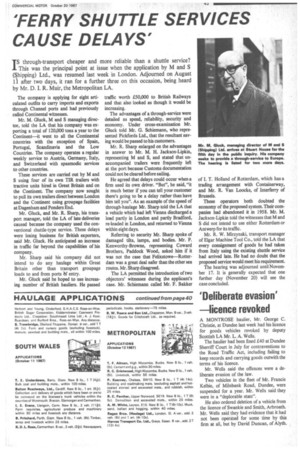'FERRY SHUTTLE SERVICES CAUSE DELAYS'
Page 45

If you've noticed an error in this article please click here to report it so we can fix it.
TS through-transport cheaper and more reliable than a shuttle service? This was the principal point at issue when the application by M and S (Shipping) Ltd., was resumed last week in London. Adjourned on August ii after two days, it ran for a further three on this occasion, being heard by Mr. D. I. R. Muir, the Metropolitan LA.
The company is applying for eight articulated outfits to carry imports and exports through Channel ports and had previously called Continental witnesses.
Mr. M. Gluck, M and S managing director, told the LA that his company was exporting a total of 120,000 tons a year to the Continent—it went to all the Continental countries with the exception of Spain, Portugal, Scandinavia and the Low Countries. The company operates a regular weekly service to Austria, Germany, Italy, and Switzerland with spasmodic services to other countries.
These services are carried out by M and S using four of its own TIR trailers with tractive units hired in Great Britain and on the Continent. The company now sought to pull its own trailers direct between London and the Continent using groupage facilities at Dagenham and Ponders End.
Mr. Gluck, and Mr. R. Sharp, his transport manager, told the LA of late deliveries caused because the company used the conventional shuttle-type service. These delays were losing business for British exporters, said Mr. Gluck. He anticipated an increase in traffic far beyond the capabilities of his company.
Mr. Sharp said his company did not intend to do any haulage within Great Britain other than transport groupage loads to and from ports of entry.
Mr. Gluck said he hoped to use increasing number of British hauliers. He passed traffic worth £50,000 to British Railways and that also looked as though it would be increasing.
The advantages of a through-service were detailed as speed, reliability, security and economy. Under cross-examination Mr. Gluck told Mr. G. Schiemann, who represented Pickfords Ltd., that the resultant saving would be passed to his customers.
Mr. R. Sharp enlarged on the advantages in answer to Mr. M. H. Jackson-Lipkin, representing M and 5, and stated that unaccompanied trailers were frequently left at the port because Customs documentation could not be cleared before sailing.
He agreed that delays could occur when a firm used its own driver. "But", he said, "it is much better if you can tell your customer there's going to be a delay rather than have him tell you". As an example of the speed of through-haulage Mr. Sharp told the LA that a vehicle which had left Vienna discharged a load partly in London and partly Bradford, re-loaded in London, and returned to Vienna within eight days.
Referring to security Mr. Sharp spoke of damaged tilts, lamps, and bodies. Mr. P. Kenworthy-Browne, representing Coward Brothers, Paddock Wood, asked him if it was not the case that Felixstowe—Rotterdam was a great deal safer than the other sea routes. Mr. Sharp disagreed.
The LA permitted the introduction of two objectors' witnesses during the applicant's case. Mr. Schiemann called Mr. F. Bakker of I. T. Holland of Rotterdam, which has a trading arrangement with Containerway, and Mr. R. Van Loocke, of Interferry of Brussels.
These operators both doubted the economy of the proposed system. Their companies had abandoned it in 1958. Mr. M. Jackson-Lipkin told the witnesses that M and S did not intend to use either Rotterdam or Antwerp for its traffic.
Mr. R. W. Mirzynski, transport manager of Elgar Machine Tool Co., told the LA that every consignment of goods he had taken from Italy using the existing shuttle service had arrived late. He had no doubt that the proposed service would meet his requirement.
The hearing was adjourned until November 17. It is generally expected that one further day (November 20) will see the case concluded.
'Deliberate evasion' —licence revoked
A MONTROSE haulier, Mr. George C. Christie, at Dundee last week had his licence for goods vehicles revoked by deputy Scottish LA Mr. L. A. Wells.
The haulier had been fined £40 at Dundee Sherriff Court in July for contraventions to the Road Traffic Act, including failing to keep records and carrying goods outwith the terms of his licence.
Mr. Wells said the offences were a deliberate evasion of the law.
Two vehicles in the fleet of Mr. Francis Kelbie, of Milribank Road, Dundee, were suspended for a year. Mr. Wells said they were in a "deplorable state".
He also ordered deletion of a vehicle from the licence of Swankie and Smith, Arbroath. Mr. Wells said they had evidence that it had not been operated for some time by this firm at all, but by David Duncan, of Alyth.








































































































































